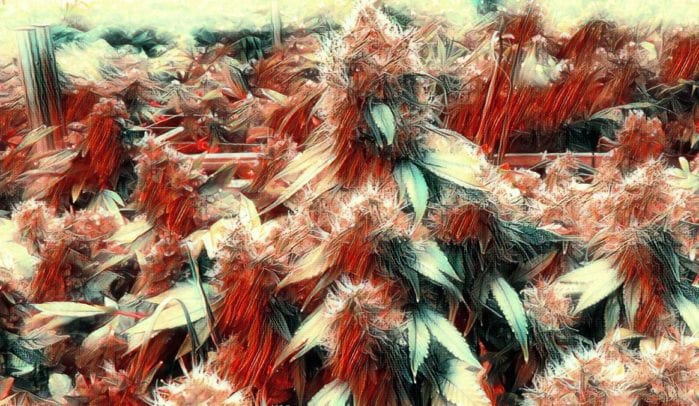
“Nobody was really wearing masks at all, then I kind of made a stink about it because I saw what was growing, the mold that was growing, and if you are going to be cleaning, you should have something protecting your face.”
In January 2018, I wrote an article for DigBoston titled “Is there moldy cannabis in Mass?” It featured former employees from New England Treatment Access (NETA) turned whistleblowers, one of whom said, “Mold was an issue at both [NETA’s] Franklin cultivation center and the Northampton dispensary.”
Last week, on my streaming show and podcast The Young Jurks, I interviewed four former employees from NETA. Barbara Carrapichano worked as a front-end associate in Brookline, while three others—Rob Cawley, Chris Perkins, Corinne Prado—were employed at NETA’s Franklin location, and also raised health and safety concerns.
“In my mind, the response to the COVID-19 pandemic is like [NETA’s] response to every problem they had,” Cawley said. “It’s a paper response, it exists in emails, it exists in workbooks and in handbooks, in task forces, but nothing gets done, nothing changes. And the people working today at NETA are in danger. It’s a dangerous, unsafe working environment. It’s something that needs to be addressed immediately, today, right now.”
Excerpts from our conversation are transcribed below. NETA did not respond to a request for comment.
Cawley: On March 31st we had an email from the company of a confirmed COVID-19 case in our cultivation facility at our Franklin location. … Where we worked we can’t really be distant. Social distancing would require a real program, thought out, implemented and executed, spacing, distance, PPE. They had us reusing masks and gloves, they have one sink in the trim room that routinely runs out of hot water. You wash your hands with cold water, it’s not adequate.
Carrapichano: Back in March, I ended up taking a personal leave of absence because I was uncomfortable actually going to work because I have an auto-immune disease, so I was trying to protect myself to the best of my abilities because things weren’t being handled appropriately as they should have been when you have immuno-compromised folks on your staff. …
We were told social distancing was going to be a thing, but there were still congregating areas, because there’s not much elsewhere to go.
Perkins: There’s so little space in this building, there’s between 17-25 people in the (extraction) room, production employees.
What happened after the Boston Globe published a story with your name and quote with union organizing also happening at NETA?
Carrapichano: Eight days later, after that article was released, I lost my job, laid off.
Perkins: We were in the middle of getting a union election going and that’s when they scheduled these layoffs for.
Cawley: There were more fires when I worked there than fire drills because we never had fire drills and we did have a fire.
That’s how big cannabis thinks about their frontline workers, thinks about the trim room workers. They didn’t care enough about us to make sure we knew how to get out of that room.
You’d think that with industrial cannabis production, it would be leading edge, the best of the best. This is medically essential, but for us to be treated as medical essential workers you would think that would be equitable.
Prado: None of the regulatory agencies seem to know who is in charge of the health and safety of the cannabis industry. I went to OSHA—they said their hands were tied until somebody either lost life or limb because (cannabis) is not under federal jurisdiction, so I called the Department of Labor and they told me to call the CCC, and so I called the CCC and they said, “Thank you for your input.”
Massachusetts Cannabis Control Commission has opened an investigation of NETA regarding COVID-19. Did a CCC investigator call you?
Cawley: Yeah, it was in the news, the preparedness, if you want to call it that, the program for response to the COVID-19 outbreak in the Franklin cultivation facility. I understand that is probably what is in their scope, and only within their scope of what they are allowed to investigate, but what’s the point of the [CCC], if what I’m telling them about the unsafe work conditions [is not addressed]—every table in the trim room is broken, missing a part of its leg, or not supported right, every chair is broken, not giving enough lumbar support for the trimmers, 10 hours a day in the trim room?
Prado: He [the CCC investigator] was trying to establish the timeline [of NETA’s COVID-19 response], what kind of emails and communications they had with all of us.
Carrapichano: I gave [the CCC investigator] a timeline of the emails we had received and the communications I had witnessed. [I] was able to provide a decent amount of information [from] the emails where they [NETA management] told us all these things, provisions that they were getting us, and then the protocol was going to be implemented, but then nothing at all got done, it was just smoke and mirrors.
Mold?
Prado: Humidity and water damage with the fire and just general spills through the whole foundation, the operating space, seeping into the walls, that’s the beginning of the contamination. When I was there, working in environmental services, cleaning cultivation rooms, flower rooms, veg rooms, nurseries, the clone area, the walls that I saw had mold on the inside of them. The A/C units had mold on the inside of them, in corners, mold everywhere; allegedly they air tested and are completely fine.
Did they provide you masks to clean [mold] with?
Prado: Yes, that was the struggle. We had N95s; at first, nobody was really wearing masks at all, then I kind of made a stink about it because I saw what was growing, the mold that was growing, and if you are going to be cleaning, you should have something protecting your face. I ended up getting a respirator, but that took a month and a half to get with the paperwork.
How did the mold issue harm you?
Prado: Mostly the areas I noticed that I had issues was anytime they did anything with the A/Cs, because they were caked in mold. I know for a fact—those tests I had done … on just one tiny little swab sample … I sent it to an independent lab.
I had a worker’s comp claim open. Eventually, after working in those environments for so long, I got asthma and couldn’t breathe anymore, so I asked for medical accommodation.
Cawley: I know people who worked there developed full-blown asthma, two or three weeks working in [the trim room], and they can’t breathe. They are on allergy meds just to survive. People in the room have to resort to sticking paper towels up their noses; people wear multiple recycled masks because they aren’t qualified yet for a real respirator—they say it’s such a big deal to get one fitted, it’s so specific, yet there’s a couple of them just lying around out back that have been forgotten about covered in dust.
Perkins: I walked by a table and I heard a kid I didn’t know talking to his manager and his manager is gaslighting him about sick days … turns out he ended up getting a medical condition from that room, COPD, and his managers were gaslighting him telling him it wasn’t the room, it wasn’t work and he had scarring in his lungs. I had pneumonia a month after working in that room. He worked there in that room for four or five months.
Prado: It was concerning immediately because I realized what a hazard everything was and nobody either knew or cared.
Union organizing?
Carrapichano: I organized some of it, so I definitely partook in the organizing for the union because we weren’t being listened to. The environment had changed tremendously, it was like walking around on eggshells every day. … Management was always under tremendous amounts of pressure … and nobody really knew how to handle it properly. I made it known to management [that] I’m a union organizer: You guys aren’t listening to us, it needs to change.
Cawley: Low and behold here comes the axe, half the company and who did they let go, all the front line workers … where [there] was the most support for the union. … It’s a mess.
Mike Crawford is a Massachusetts medical cannabis patient and founder of The Young Jurks and midnightmass.substack.com. You can listen to The Young Jurks on iTunes or wherever else podcasts are streamed. This article was produced with support from Midnight Mass and The Young Jurks, where your contributions are greatly appreciated and help us deliver more local coverage.
Mike Crawford is a Massachusetts medical cannabis patient and founder of The Young Jurks and midnightmass.substack.com. You can listen to The Young Jurks on iTunes or wherever else podcasts are streamed. This article was produced with support from Midnight Mass and The Young Jurks, where your contributions are greatly appreciated and help us deliver more local coverage.

